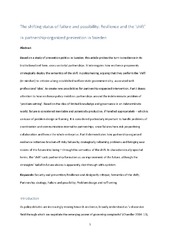The shifting status of failure and possibility: Resilience and the ‘shift’ in partnership-organized prevention in Sweden
Journal article, Peer reviewed
Accepted version

Åpne
Permanent lenke
https://hdl.handle.net/1956/21926Utgivelsesdato
2020Metadata
Vis full innførselSamlinger
Sammendrag
Based on a study of prevention politics in Sweden, this article probes the turn to resilience in its institutionalized form: cross-sectorial partnerships. It interrogates how resilience proponents strategically deploy the semantics of the shift in policymaking, arguing that they perform the ‘shift’ (in mind-set) to criticize a long-established welfare-state governmentality, associated with professional ‘silos’, to create new possibilities for partnership-organized intervention. Part I draws attention to how resilience policy mobilizes partnerships around the indeterminate problem of ‘problem setting’. Based on the idea of limited knowledge and governance in an indeterminate world, failure is considered inevitable and potentially productive, if handled appropriately – which is an issue of problem design or framing. It is considered particularly important to handle problems of coordination and communication internal to partnerships, since failures here risk jeopardizing collaboration and hence the whole enterprise. Part II demonstrates how partnership-organized resilience initiatives bracket-off risky failure by strategically reframing problems and bringing new visions of the future into being – through the semantics of the shift. In characteristically epochal terms, the ‘shift’ casts partnership formation as an improvement of the future, although the strategists’ belief in future visions is apparently shot through with cynicism.